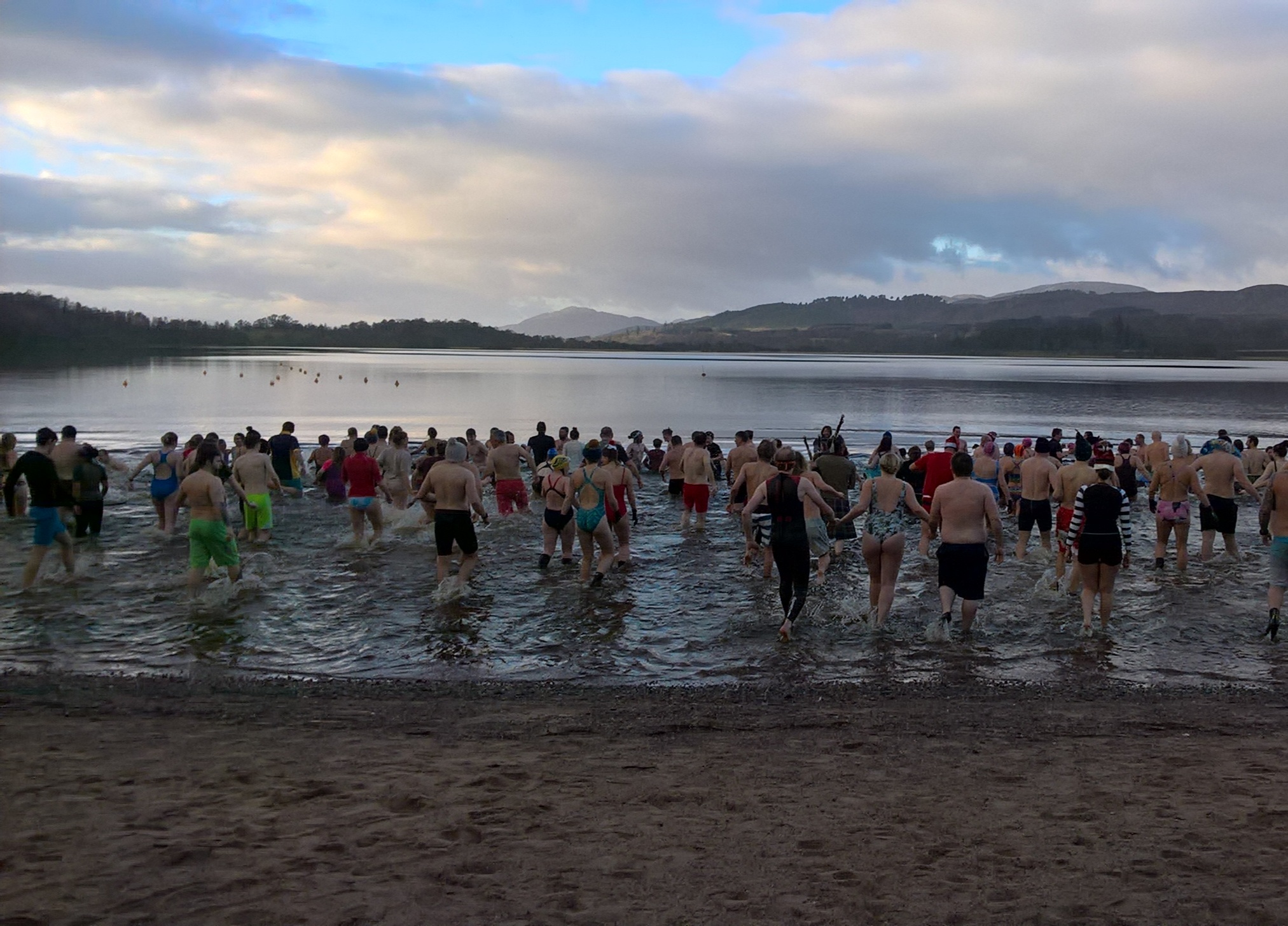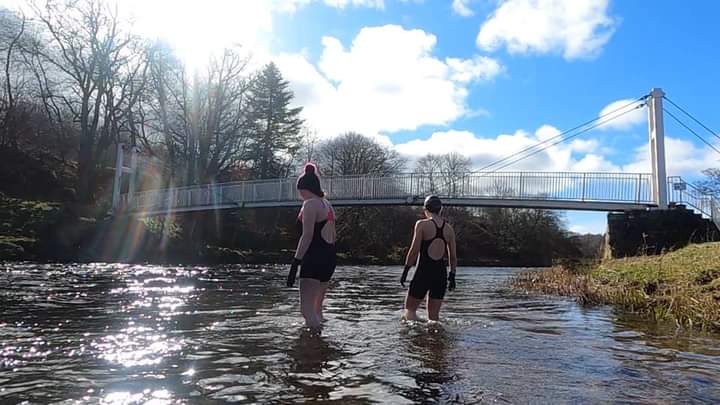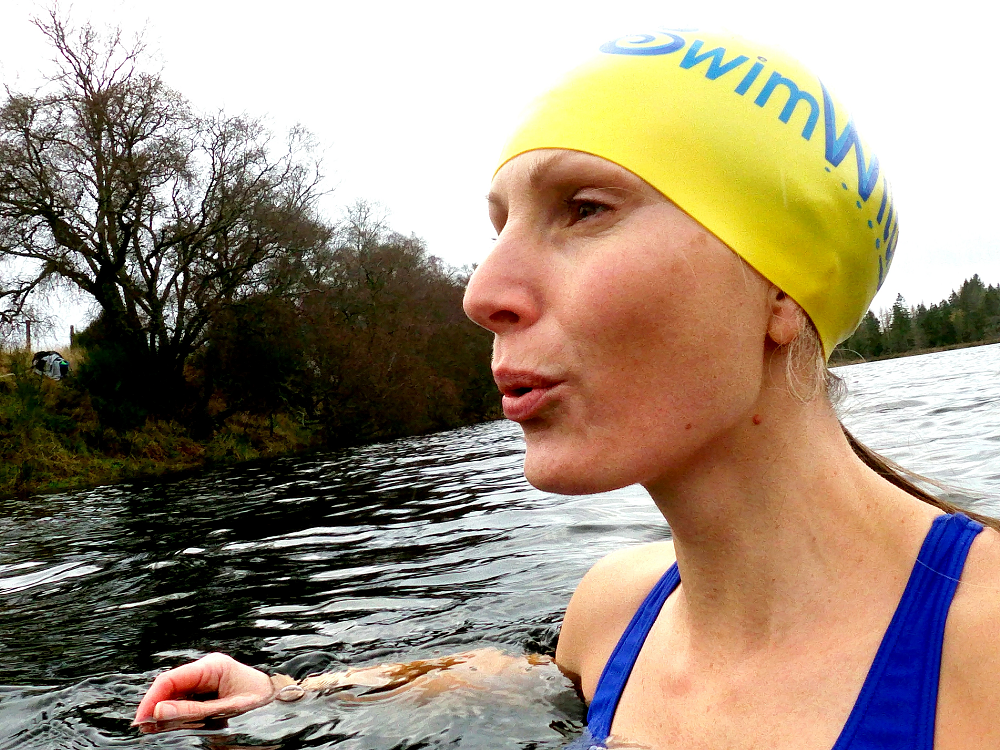Why is cold water so good for us?
What are the benefits of cold water? Cold water’s a hot topic these days, with more and more people jumping in. Wild swimming is certainly growing in popularity (Outdoor Swimmer reports a boom in outdoor swimming in 2020) and we’re starting to see celebrities getting in on the act too with cold showers and ice baths.
We keep hearing that cold water is “good” for us, but why exactly? Is it purely the physical exposure to the cold and our body’s reaction to it, is it something to do with building mental resilience, or is it something else?
As a cold water fan myself, I’m used to the responses I get from non-dippers: You’re mad! I couldn’t do that! Oh no it’s too cold! I’m a wuss! I hate being cold! Why would you put yourself through that?
But the fact that people can react so strongly to the idea tells me there’s something interesting about it. (Not to mention that most of the non-dippers who protest so much usually end up dipping themselves…)
There’s something that fascinates us and tempts us in.
So this is what I wanted to know: what drives people to go into cold water? And what exactly are the positive benefits from it that keep us coming back for more?

What is this thing with cold water?
(photo by Ewan Scott: New Year’s Day dippers in Loch Insh)
I was keen to hear people’s experiences, so I surveyed some wild swimmers in the North East and Highlands of Scotland. I asked them about their experiences with starting, and continuing, cold water swimming, and also about the idea of cold showers and how it compares.
The answers were absolutely inspiring and joyful to read, and they reminded me why I love this strange activity so much.
They also surprised me in many ways, and made me realise that we are being fed a whole lot of stereotypes around what types of people are taking part in this chilly hobby and why…
Building resilience?
My own journey into cold water swimming was one of resilience and overcoming fear, so I wondered if this sense of achievement or overcoming something difficult could be what made people take up cold water swimming and keep going back. With cold water showers and ice baths now being promoted in a sort of “success-achievement” kind of context, I wondered if it was this desire to overcome and be brave that was making us all go for the cold water.
For the majority of cold water swimmers, it appears, it’s not that.
Only 2% of respondents stated that they started wild swimming because they were training for a sporting event; only 7% said that they were going through a struggle in life at the time they took it up; and not a single person said that they had a fear of open water they wanted to overcome.
Have we just gone mad?
The media love to show us endless images of people (especially women) going into cold water in swimsuits and woolly hats; even better if it’s accompanied with shrieking and merriment and a general sense of “madness”.
But based on the answers I received from both men and women and from all different age groups, the joy runs a lot deeper, and across a much wider range of people, than those images would have you believe.
What draws us in
The most commonly-stated reason for trying it in the first place (28% of all respondents) was “a love of the outdoors”. The next most common answers (17% of all respondents) were that they were “looking for a sense of escape or adventure” and a “new challenge”. These top answers were consistent across genders and all age groups.
And why do we go back for more?
Overwhelmingly, it was a sense of wellbeing, enjoyment and community that shone through in people’s answers about why they continue cold water swimming.
The number one reason people said they keep going back for more is because they “feel physically or mentally better afterwards”. This answer was common across 42% of all respondents, and was consistent across gender and age.
In close second place (32%) was “the feeling of achievement”. So even though we may not go into the water looking to achieve something, it seems we certainly feel that coming out. Interestingly, the feeling of achievement was greater with each increasing age group, and it factored more highly in the female swimmer’s responses than males.
The “social interaction” was another reason why people said they keep going back for more swimming. This was a more common answer in swimmers over the age of 65 (21% of them), while in the younger age groups only 11% stated that as one of their reasons.
The Benefits of Cold Water Swimming
I was keen to explore the idea that people “feel physically and mentally better afterwards” when they’ve been for a dip. What, exactly, mentally and physically?
This is where it gets interesting.

Why the heck do we put ourselves into cold water?
(photo by Elizabeth Ternent: a winter dip in Burnhervie)
When I asked what benefits people get from cold water swimming, here was the consensus on each of the options:
- Improved moods (30%)
- Better sleep (18%)
- Increased fitness (15%)
- Better controlled body temperature (10%)
- Less headaches or fatigue (10%)
- Reduced pain (9%)
- Better digestion (4%)
(Two respondents did reply “none” to the question of what benefits they feel they get from cold water swimming, and I think it’s important to acknowledge that. While lots of people venture into this activity because they’ve heard it’s “good for us”, it’s also a sport just like any other – and we can have many reasons for needing or wanting to simply participate in a sport.)
In general, female swimmers were more likely to report improved moods (31%) as their top answer, and better sleep (19%) as their second. Whereas the top two male answers were improved moods (25%) and better controlled body temperature (25%). The third most common answer was the same for males and females: “increased fitness”. While the fourth was “less headaches and fatigue” for females and “less pain” for males.
Interestingly, these answers were widely the same regardless of the age groups of the respondents, and regardless of whether they were swimmers or non-swimmers before starting their wild dipping.
It’s a whole “thing”
I wanted to delve deeper into the enjoyment of this activity, so I asked a few open-ended questions about what aspects of cold water dipping people enjoy and why.
The participants described different types of joy at all stages in the process of a swim.
The getting in:
…It’s the best part, going in. I feel excited but I walk slowly to savour the feeling of the water as its weight embraces me…
…As I’m getting in I question my sanity and ask myself why I do this. Once I’m in I just want to stay there…
…Sometimes I’m very aware of the cold for the first few minutes and that’s not particularly pleasant, but I know that feeling always passes and then it’s just the pure pleasure of being in the water…
The feelings afterwards:
…buzzing, energised…
…relaxed, calm…
…fresh, tingling, exhilarated…
…clear of thought and mind…
…I feel a glow all over…
…Immediately afterwards I usually feel as high as a kite! I feel as though I could take on the world and conquer. Later, I feel content, and have a sense of achievement in my mind and body…
…I feel so relaxed and completely zen. There is such a calmness that comes over you. I also feel really happy and know I’m going to sleep well that night…
And even when I asked the swimmers about their favourite way of warming up after a cold water dip, there was a sense of joy and contentment that came through in their words about warm clothes, cups of tea, pieces of cake and laughs with friends.
It was clear that it’s the whole “thing” itself that makes people feel good. Not just the physical dip in the water. And people take pleasure in different – or all – parts of the process.
Contrast it with cold showers and ice baths
While a lot of the answers around cold water swimming had the same themes of general happiness and wellbeing to them, my questions around cold water showers split the respondents down the middle in a marmite-type fashion.
A small minority said they do take cold showers, but majority said they didn’t, and there were quite a few “Why would you do that?!” type of answers to the question. Someone even said they were “too much of a wuss” to take a cold shower! This from people who regularly swim in cold water.
It got me thinking about how we see ourselves and what our reasons are for getting into the cold water in the first place.
Let’s look at the growing popularity of cold showers and ice baths. The benefits of these activities are generally said to be connected to things like improved immunity, reduced inflammation, building resilience, and daily “success” habits. People go into it with the expectation that it’s going to improve their health or give them a stronger mindset and the ability to achieve things in their lives.
I’ve done the daily cold showers, and still do them occasionally. In my experience, it is not pleasant and it doesn’t get any more pleasant the more I do it. I would wade into a freezing cold loch in a swimsuit any day before choosing to have a cold shower. Don’t ask me why the shower is worse, but it is. But I still do it anyway when I want to challenge myself.
I think it’s safe to assume with a cold shower or ice bath you’re repeatedly exposing yourself to something unpleasant. In itself, the act of doing this will provide a “reward” of a sense of achievement, and the reassurance that you can do hard things. The repetition creates a success loop, which builds self-belief, and this is no doubt why it’s considered to be a success habit.
In my opinion, cold showers and ice baths are beneficial, and I think it’s just a narrower, more specific set of benefits we get from them.
We saw above that in fact a lot of cold water swimmers also feel a sense of achievement when they’ve been in the water; however we also saw that they don’t necessarily go into it looking for a sense of achievement.
So I got my answer… kind of
I wanted to know:
- What draws us into cold water in the first place; and
- Why do we keep going back?
The answer I got was: there’s no single reason. And I think that’s great.
While cold showers and ice baths are more of an intentional act designed to achieve specific physical and mental outcomes, cold water swimming seems to deliver a range of benefits unique to each person. And in fact those benefits may be unexpected and not even related to the reason the person first tried it out.
Almost like the water itself, the benefits of cold water swimming flow into us and fill whatever “gaps” we each have that need filling. Whether they be social, mental, physical, environmental, spiritual or otherwise.
And it’s clear the reward associated with cold water swimming goes beyond just the cold water immersion itself – it’s the joy of being outdoors in nature, the pleasure of a shared experience by taking part in a group, and maybe the post-swim treat of having a hot drink or chat with friends afterwards.
Will you dip your toe in?
I think for whatever reason you want to go into cold water (just make sure you do it safely please), the chances are it’s going to do you good.

And don’t worry about the media-fuelled stereotypes. It doesn’t matter your age, gender or race, whether you’re looking to win a triathlon, escape the symptoms of menopause, or achieve a daily goal. Just start a relationship with the water in its purest and natural form: cold.
Go with the flow… and see where it takes you.
And if you need any more encouragement, I’ll leave you with you some final thoughts from the wonderful, inspirational cold water dippers who took part in my survey:
…Cold water swimming has made me proud of my body again. I admire it for taking me into the cold water and managing to swim. I feel strong and powerful after a cold swim. I found mental strength I absolutely didn’t know I had…
…It erases tension and rests me…
…I doubt I could do it alone but absolutely love the camaraderie of fellow swimmers…
…I really do feel at one with nature…
…I live alone and had recently separated from my husband, so meeting cheerful mad swimmers very often made my day. And I do think the cold water has a good effect on your mood. Stops you feeling sluggish. You have achieved something! Done that crazy thing that most people think is impossible, and feel so, so good!…
…I love all the people I have met – so inclusive and friendly and great fun…
…Outdoor swimming is like a form of meditation for me. It’s weirdly addictive and I think it’s 100% beneficial. I would recommend it to anyone who even has a flicker of interest in it – they won’t regret giving it a go…
…If you haven’t already tried it, give it a go. It’s amazing how good you feel when you’re swimming surrounded by nature…
With thanks to the members of Cairngorm Wild Swimmers and Aberdeenshire Open Water Swimming.
And a final note about safety: I have not gone into any safety concerns about open water swimming here, as there is so much to say and I’m not an expert in water safety. All I will say is please do your own research on safety and your own risk assessments before you venture into the water.
This survey was conducted by Heather McKay between February and May 2021. Respondents were members of wild swimming groups in the North-east and Highlands of Scotland and included 63 individuals ranging in age from 25 to over 65. For any further details about my survey, please email hello@become-aligned.com

